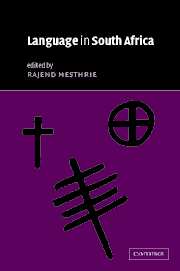Book contents
- Frontmatter
- Contents
- List of maps
- List of contributors
- Acknowledgements
- List of phonetic symbols
- List of abbreviations
- Introduction
- Part I The main language groupings
- Part II Language contact
- 9 Fanakalo: a pidgin in South Africa
- 10 Mutual lexical borrowings among some languages of southern Africa: Xhosa, Afrikaans and English
- 11 Code-switching, mixing and convergence in Cape Town
- 12 Code-switching in South African townships
- 13 Intercultural miscommunication in South Africa
- 14 Women's language of respect: isihlonipho sabafazi
- 15 The sociohistory of clicks in Southern Bantu
- 16 The political economy of language shift: language and gendered ethnicity in a Thonga community
- 17 From second language to first language: Indian South African English
- 18 Black South African English
- 19 The lexicon and sociolinguistic codes of the working-class Afrikaans-speaking Cape Peninsula coloured community
- 20 An Introduction to Flaaitaal (or Tsotsitaal)
- 21 Language and language practices in Soweto
- Part III Language planning, policy and education
- Index
- References
19 - The lexicon and sociolinguistic codes of the working-class Afrikaans-speaking Cape Peninsula coloured community
from Part II - Language contact
Published online by Cambridge University Press: 22 September 2009
- Frontmatter
- Contents
- List of maps
- List of contributors
- Acknowledgements
- List of phonetic symbols
- List of abbreviations
- Introduction
- Part I The main language groupings
- Part II Language contact
- 9 Fanakalo: a pidgin in South Africa
- 10 Mutual lexical borrowings among some languages of southern Africa: Xhosa, Afrikaans and English
- 11 Code-switching, mixing and convergence in Cape Town
- 12 Code-switching in South African townships
- 13 Intercultural miscommunication in South Africa
- 14 Women's language of respect: isihlonipho sabafazi
- 15 The sociohistory of clicks in Southern Bantu
- 16 The political economy of language shift: language and gendered ethnicity in a Thonga community
- 17 From second language to first language: Indian South African English
- 18 Black South African English
- 19 The lexicon and sociolinguistic codes of the working-class Afrikaans-speaking Cape Peninsula coloured community
- 20 An Introduction to Flaaitaal (or Tsotsitaal)
- 21 Language and language practices in Soweto
- Part III Language planning, policy and education
- Index
- References
Summary
INTRODUCTION
Ethnographic research between 1963 and 1991 (Stone 1991) has confirmed that members of the working-class Afrikaans-speaking Cape Peninsula coloured community speak a distinctive dialect (mother tongue of a region or community), and not merely slang. The dialect is a marker of the community's identity, which is reflected in endogamy, ties of descent, kinship and preferential association, and shared residential areas, both voluntary and enforced. Irrespective of ‘racial’ appearance, members of this community have tended throughout the period of research to identify themselves informally as bryn ‘brown’; the formal English translation, ‘coloured’, has to some extent different connotations, although the denotation is identical.
Very broadly speaking, coloured identity is part of a national system of communal identity formation whose two poles are ‘black’ and ‘white’. Coloured identity is regarded as intermediate, paradoxical, anomalous, deracinated and liminal in South African society (Turner 1969). This opens it to ambivalence: one the one hand, to sacralisation as humble, egalitarian and creative of identity, and on the other to stigmatisation as bastardised, outcast and destructive of identity. To the extent that the national system is consensually maintained, coloured communal identity may well continue as long as the system does (despite the collapse of legalised apartheid).
White domination promoted, exploited and rigidified this system, with virtually total success from 1948 until it bred the first mass civil rebellion in black and coloured communities in 1976.
- Type
- Chapter
- Information
- Language in South Africa , pp. 379 - 397Publisher: Cambridge University PressPrint publication year: 2002

